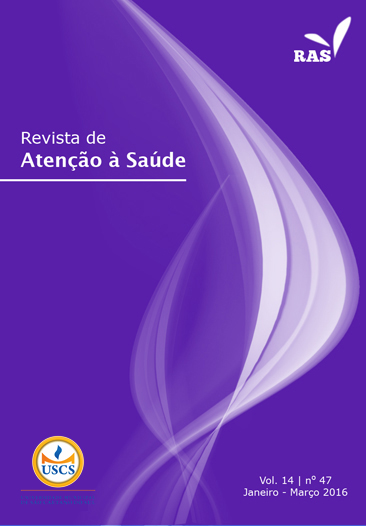Family relationships of women on hemodialysis
DOI:
https://doi.org/10.13037/ras.vol14n47.3283Keywords:
Chronic renal insufficiency, Women, Family, NursingAbstract
may generate anguish and fear of the unknown. The person with chronic kidney disease depends of care,and the family is characterized as a fundamental element in the process of meeting the patient’s needs;however, the emotions in family relationships can be considered positive or negative, since the complexityof each family sets the differences and consistencies of each person. Objective: To know the family relationshipsof women on hemodialysis in the context of chronic kidney disease. Materials and Methods:A qualitative, exploratory, and descriptive study, carried out in 2012 in a nephrology service. Participantswere six women on hemodialysis who answered open and closed questions and had their family genogramconstructed by an instrument. For the analysis, exhaustive reading of data, coding and aggregation to corethemes was performed. Results: The core themes involved the negative and positive family relationshipsexperienced by women on hemodialysis. In negative family relationships, difficulties in paying attention,offering support, and understanding the demands of care generated by hemodialysis were observed, withconflict and neglect in some cases. In positive family relationships, there was support, understanding andcare according to the needs. Conclusions: Negative or positive family relationships of women with kidneydisease on hemodialysis may be linked with existing interpersonal relationships. Thus, knowing the familyrelationships of women on hemodialysis can promote appropriate intervention in aspects of family life.Downloads
References
1. Daugirdas JT, Blake PG, Ing TS. Manual de diálise. 4ª ed.Rio de Janeiro: Guanabara; 2010.
2. Oliveira VA. As experiências em família: a compreensão das mulheres em hemodiálise [dissertação]. Pelotas:Universidade Federal de Pelotas. Faculdade de Enfermagem,2012.
3. Bastos MG, Kirsztajn GM. Doença renal crônica: importância do diagnóstico precoce, encaminhamento imediato e abordagem interdisciplinar estruturada para melhora do desfecho em pacientes ainda não submetidos à diálise. J bras nefrol. 2011;33(1):93-108.
4. Fortes VLF, Bettinelli LA, Pomatti DM, Brock J, Dobner T. Itinerário da doença renal crônica: do prenúncio à descoberta. Rev Rene. 2013;14(3):531-40.
5. Oliveira SG, Marques IR. Sentimentos do paciente portador de doença renal crônica sobre a autoimagem. Rev enferm Unisa. 2011;12(1):38-42.
6. Diogo HRSM. O cotidiano das mulheres em tratamento hemodialítico: potencialidades e limites [dissertação]. Pelotas: Universidade Federal de Pelotas. Faculdade de Enfermagem, 2010.
7. Barreto MS, Marcon SS. Doença renal crônica: vivências e expectativas do cuidador. Rev enferm UERJ. 2012;20(3):374-9.
8. Silva AS, Silveira RS, Fernandes GFM, Lunardi VL, Backes VMS. Percepções e mudanças na qualidade de vida de pacientes submetidos à hemodiálise. Rev bras enferm. 2011;64(5):839-44.
9. Caetano JPM, Fernandes MV, Marcon SS, Decesaro MN. Refletindo sobre as relações familiais e os sentimentos
aflorados no enfrentamento da doença crônica. Cienc cuid saude. 2011;10(4):845-52.
10. Feijó AM, Schwartz E, Jardim VMR, Linck CL, Zillmer JGV, Lange C. O papel da família sob a ótica da mulher acometida por câncer de mama. Cienc cuid saude. 2009;8:79-84.
11. Diretrizes e normas regulamentadoras de pesquisa envolvendo seres humanos. Resolução nº 196, de 10 de outubro
de 1996. Brasília: Conselho Nacional de Saúde; 1996.
12. Wright LM, Leahey M. Enfermeiras e famílias: guia para avaliação e intervenção na família. 5ª ed. São Paulo: Roca; 2012.
13. Wendt NC, Crepaldi MA. A utilização do genograma como instrumento de coleta de dados na pesquisa qualitativa. Psicol reflex crit. 2008;21(2):302-10.
14. Minayo MCS. O desafio do conhecimento: pesquisa qualitativa em saúde. 13ª ed. São Paulo: Hucitec; 2013.
15. Mattos M, Maruyama SA. A experiência em família de uma pessoa com diabetes mellitus em tratamento por hemodiálise. Rev eletr Enferm [periódico na Internet]. 2009 [acesso em 2014 Dez 23];11(4):971-81. Disponível em: http://www.fen.ufg.br/revista/v11/n4/v11n4a23.htm
16. Prestes FC, Colomé CL, Tavares JP, Silva RM, Cordenuzzi OCP, Burg G, et al. Percepção dos trabalhadores de enfermagem sobre a dinâmica do trabalho e os pacientes em um serviço de hemodiálise. Texto contexto enferm. 2011;20(1):25-32.
17. Schwartz E, Muniz RM, Burille A, Zillmer JGV, Silva DA, Feijó AM, et al. As redes de apoio no enfrentamento da doença renal crônica. Rev min enferm. 2009;13(2):183-92.
18. Moreno V. Familiares de pacientes em hemodiálise convivendo com condições crônicas de saúde. Rev Rene. 2008;9(4):40-56.
Downloads
Published
Issue
Section
License
Copyright (c) 2016 Vanessa Athaydes Oliveira, Eda Schwartz, Marilu Correa Soares, Bianca Pozza dos Santos, Raquel Pötter Garcia, Fernanda Lise

This work is licensed under a Creative Commons Attribution-NonCommercial-NoDerivatives 4.0 International License.
Policy Proposal for Journals offering Free Delayed Access
Authors who publish in this magazine agree to the following terms:
- Authors maintain the copyright and grant the journal the right to the first publication, with the work simultaneously licensed under a Creative Commons Attribution License after publication, allowing the sharing of the work with recognition of the authorship of the work and initial publication in this journal.
- Authors are authorized to assume additional contracts separately, for non-exclusive distribution of the version of the work published in this magazine (eg, publishing in institutional repository or as a book chapter), with the acknowledgment of the authorship and initial publication in this journal.
- Authors are allowed and encouraged to publish and distribute their work online (eg in institutional repositories or on their personal page) at any point before or during the editorial process, as this can generate productive changes, as well as increase impact and citation of the published work (See The Effect of Open Access).









